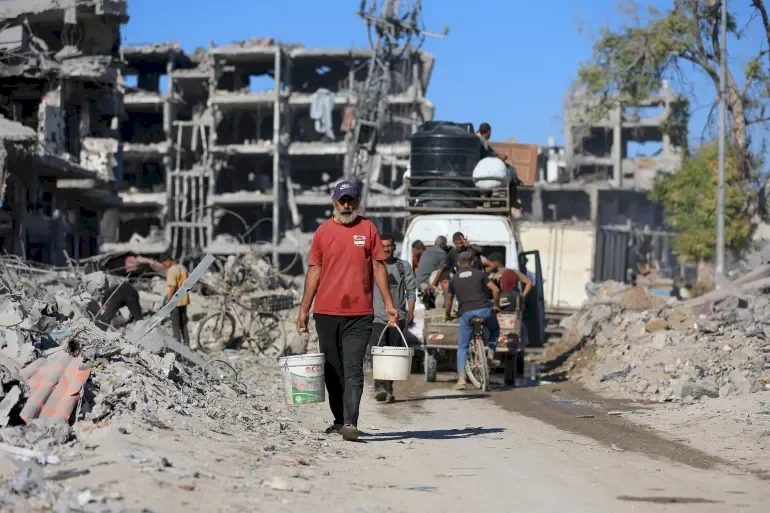
Report: Gaza on the Brink of Complete Environmental Collapse
SadaNews - A new report from the Arava Institute for Environmental Studies in Israel warns that the Gaza Strip is facing a complete environmental collapse that threatens its recovery after nearly two years of devastating war. It notes that water is contaminated, agricultural land is destroyed, and the electricity network is nearly collapsed.
The Independent quoted the report published by the institute following the announcement of a ceasefire between Israel and the Islamic Resistance Movement (Hamas) brokered by the United States, stating that about 69% of the infrastructure in the region has been damaged.
Around 80% of agricultural land has been damaged or destroyed, resulting in a tenfold increase in malnutrition rates compared to the situation before the conflict.
The report added that military activities, especially the movement of heavy machinery, have caused significant damage to fertile soil, undermining Gaza's ability to produce its own food in the future.
The report explained that Israeli restrictions on coastal waters have made fishing nearly impossible, leading to the deaths of 120 Palestinian fishermen.
It noted that 93% of families in the Gaza Strip suffer from water insecurity, with the daily per capita water allocation not exceeding 8.4 liters, which is below the emergency minimum recommended by the World Health Organization.
All sewage treatment plants have ceased operations, causing raw sewage to flow into the streets and threatening groundwater with contamination and the spread of epidemics, according to the British newspaper citing the Israeli institute's report.
The report called for a phased strategy for rebuilding Gaza led by the local community, which includes creating independent networks for water, energy, and agriculture, and establishing concepts of climate resilience and joint governance of resources.
According to the report, the shutdown of treatment plants has forced residents to drain wastewater into temporary ponds that threaten to overflow into streets and homes, possibly contaminating the shared coastal groundwater, which is the main source of water in the region.
The ability to generate electricity has also dropped by more than 80%, leading to power outages lasting up to 22 hours a day, with near-total reliance on diesel generators to carry out relief operations.
The report reiterated the need for a phased strategy for rebuilding Gaza led by the local community, which includes creating independent networks for water, energy, and agriculture, and establishing concepts of climate resilience and joint governance of resources.
The authors of the report emphasized that environmental recovery must be an integral part of reconstruction, warning that ignoring it will keep Gaza in a cycle of endless crises.
Source: Independent

Resistance to the Wall and Settlement: 1965 Violations Committed by the Army and Settlers...

Israel Claims: Decrease in Iranian Rocket Attacks

Israeli Army: We Bombed a Secret Nuclear Site in Iran

Netanyahu: We Will Continue to Strike Strongly in Iran and Lebanon

Conflicting Reports About the Killing of the "Experts Council" While Choosing a Replacemen...

Katz: We Decided to Control Additional Territories Inside Lebanon

Israel Evacuates Its Diplomatic Staff from the UAE

